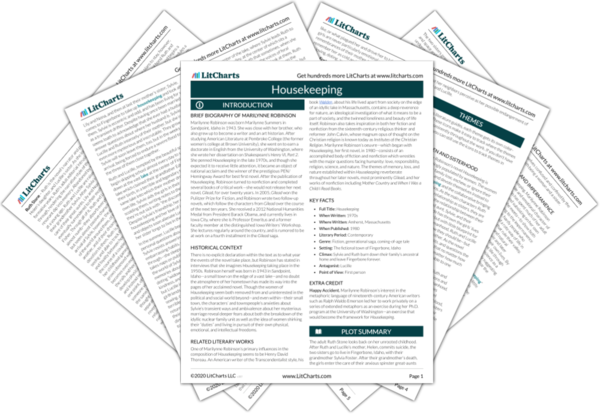Women and Sisterhood
Marilynne Robinson’s novel Housekeeping is overwhelmingly populated by women. The women of the Foster family lose, eschew, or ignore their male partners completely, and devote themselves instead to the careful art of housekeeping and the collaborative bringing up of their younger generations. As the main characters Ruth and Lucille navigate their own relationship as sisters, they are brimming with questions about the relationship between their somewhat reluctant caregiver and aunt, Sylvie, and their mother…
read analysis of Women and SisterhoodTransience and Impermanence
Throughout Housekeeping, Marilynne Robinson uses the unpredictable and emotional character of Sylvie—a transient who has spent much of her adult life riding the rails across America and subsisting on her own wiles and the kindness of strangers she meets—to show both the danger and the beauty of submitting to the impermanence of the world. The citizens of Fingerbone, hardy people who have developed an insular community and a rote way of life in…
read analysis of Transience and ImpermanenceMemory
The entirety of Housekeeping—the events of Ruth and Lucille’s youth as they suffer the loss of their mother, enter the care of their eccentric aunt Sylvie, and struggle to determine what kind of young women they will become—is relayed retrospectively from the adult Ruth’s point of view. Interspersed with the bones of what happened to her in her childhood are reflections on nature, time, love, loss, and memory itself delivered by…
read analysis of Memory
Abandonment and Loss
In the early pages of Housekeeping, Lucille and Ruth are abandoned on their grandmother Sylvia’s porch by their mother, Helen. Helen tells the girls that she’ll be back for them soon—but she drives away in the car borrowed from a neighbor back home in Washington and promptly motors off a cliff into the lake at the center of Fingerbone, her family’s ancestral home. Ruth and Lucille, seemingly numb to their mother’s death…
read analysis of Abandonment and LossNature
In Marilynne Robinson’s Housekeeping, the natural world is a character in and of itself. From the beautiful but dangerous lake at the center of Fingerbone to the rare and transformative experiences Ruth and Lucille have during their various explorations of the Idaho wilds, nature plays a pivotal role in the text and serves as a kind of litmus test in Ruth and Lucille’s attempts to discover what kind of women they want to be…
read analysis of Nature






